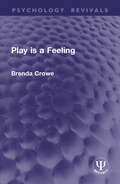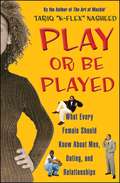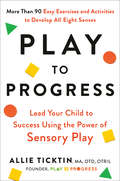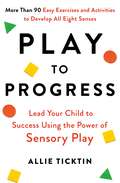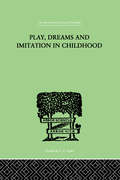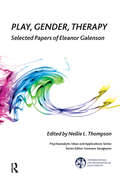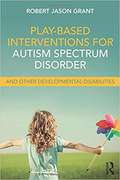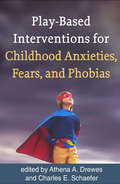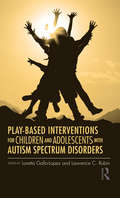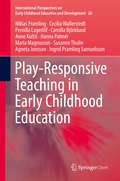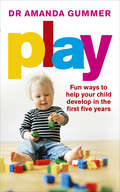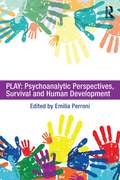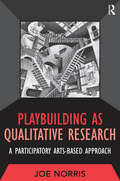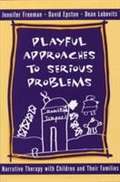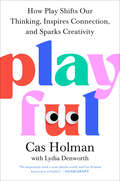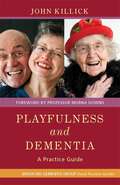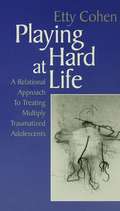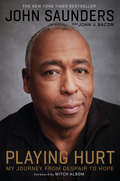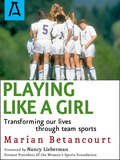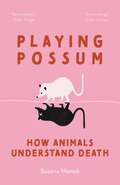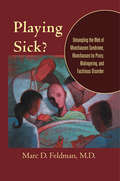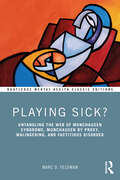- Table View
- List View
Play is a Feeling (Psychology Revivals)
by Brenda CroweOriginally published in 1983, Play is a Feeling is an exploration of the world of childhood, those first discoveries of sensation, movement, language and surroundings that are an essential part of the process through which children learn and develop. Brenda Crowe, with her amazing gift for recalling and interpreting the feelings of childhood, describes the nature of children’s fears, comforts, joy and distress which are expressed through play. At once stimulating and reassuring, this is a book that will stir memories and help many parents look at themselves and their children with fresh insight.
Play or Be Played
by Tariq "K-Flex" NasheedGot Game? It's a fact. Every woman needs game. Take Oprah, Jada Pinkett-Smith, and Beyoncé Knowles. All three of these women have the one intangible quality that every mack, male or female, must possess: they all have game. In other words, they have intelligence, hustle, and common sense that they apply to every aspect of their lives -- especially in their relationships. Play or Be Played is an instruction manual for women who are tired of being played by men and who want to be players themselves. Though women may not want to play games, the truth is men often do. So women who hope to win in the game of love must first learn the rules. Bestselling author and true mack, Tariq "K-Flex" Nasheed shares: ways to spot a scrub what it takes to get with a baller why men cheat how men really judge women the top three mistakes women make in relationships Street-smart and straightforward, Play or Be Played will help you get with a king without being a hoochie, groupie, or a chickenhead.
Play to Progress: Lead Your Child to Success Using the Power of Sensory Play
by Allie TicktinA game-changing book on child development--and the importance of physical play--for this digital and screen age.For children to develop to their fullest potential, their sensory system—which, in addition to the big five of sight, hearing, taste, touch, and smell, includes movement and balance (vestibular), body awareness (proprioception), and internal perception (interoception)—needs to be stimulated from the time they are born. Their senses flourish when they explore their environment by touching new textures, including their food, running, jumping, climbing, and splashing outside. As an occupational therapist with a specialty in sensory integration, Allie Ticktin has seen an increase in cases of children who struggle to sit in circle time or at their desk upright and who are delayed in walking, talking, and playing by themselves and with their peers. In the recent past, kids spent their days playing outside and naturally engaging their sensory system and building key developmental skills. But with increasing time pressures for both kids and parents, children are spending more time in front of screens and less time exploring and interacting with their environment. The good news is that boosting your child&’s sensory development doesn&’t take enormous amounts of time or supplies, or any special skills. Here, Ticktin discusses the eight sensory systems and how a child uses them, and offers easy, fun activities—as well as advice on setting up a play area—that will encourage their development so that your little one will be better able to respond to their emotions, build friendships, communicate their needs, and thrive in school. That&’s the power of sensory play.
Play to Progress: Lead Your Child to Success Using the Power of Sensory Play
by Allie TicktinFor children to develop to their fullest potential, their sensory system - which, in addition to the big five of sight, hearing, taste, touch, and smell, includes movement and balance (vestibular), body awareness (proprioception), and internal perception (interoception) - needs to be stimulated from the time they are born. Their senses flourish when they explore their environment by touching new textures, including their food, running, jumping, climbing, and splashing outside - never through screens.As an occupational therapist with a specialty in sensory integration and early childhood development, Allie Ticktin has seen an alarming increase in cases of children who can't sit in circle time or at their desk upright and who are delayed in learning to walk, talk, or socialise, many of whom have been diagnosed with ADHD or sensory processing disorders, in part because these critical systems have been neglected. In the recent past, the sensory system and many developmental skills evolved naturally outside in the garden or on the playground. But with increasing time pressures for both kids and parents, as well as safety concerns, children are often sat in front of screens, without sufficient opportunity to explore and interact with their environment.The good news is that boosting your child's sensory development doesn't take enormous amounts of time or supplies, or any special skills. In Play to Progress, Ticktin discusses the eight sensory systems and how a child uses them, and offers easy, fun activities that will encourage their development so that your little one will be better able to respond to their emotions, build friendships, communicate their needs, and thrive in school. That's the power of sensory play.
Play, Dreams And Imitation In Childhood
by Piaget, JeanFirst published in 1999. Routledge is an imprint of Taylor & Francis, an informa company.
Play, Gender, Therapy: Selected Papers of Eleanor Galenson (The International Psychoanalytical Association Psychoanalytic Ideas and Applications Series)
by Nellie L. ThompsonEleanor Galenson had a remarkable career whose singular focus was her life-long interest in the maturational and psychosexual vicissitudes of infancy and early childhood. The selection of her writings in this volume highlight her approach to the study of the early years of life and, in particular, her contributions to understanding the developmental significance of the very young child's discovery of sexual difference, and the ways in which each child expresses this through play, symbolization and language. Interviews that Galenson gave to Milton Senn and Lucy LaFarge provide a Prologue to the Volume. They introduce the reader to her voice, and portray the milieu within which she matured and worked as a pediatrician, researcher and psychoanalyst. Papers are organized in three parts that illustrate different facets of Galenson's thinking and work: Symbolization, Thought and Language; Infantile Origins of Sexual Identity; and The Tripartite Therapeutic Model. Parts 1 and 2 are introduced by Patricia Nachman and Lucy LaFarge, respectively, colleagues and friends of Galenson who are deeply familiar with her work.
Play, Learning, and Children's Development
by Marilyn Fleer Mariane HedegaardThis book explores the dynamics in children's everyday lives as they move between school and the family, with particular consideration of how children's motives change in response new challenges. Professors Mariane Hedegaard and Marilyn Fleer follow four children, two from Australia and two from Denmark, over a twelve-month period. Using these case studies, they show how children's everyday activities, play, and the demands of both family and educational contexts influence their learning and development. The authors contribute to a sociocultural theory formulation that includes the child's perspective in cultural historical contexts. Their approach yields insights that transcend specific nationalities, cultures, and socioeconomic situations. The analysis shows not just how children's family life shapes their experiences in school, but how schools influence and shape their lives at home.
Play, Playfulness, Creativity and Innovation
by Paul Martin Patrick BatesonWhat role does playful behaviour and playful thought take in animal and human development? How does play relate to creativity and, in turn, to innovation? Unravelling the different meanings of 'play', this book focuses on non-aggressive playful play. The authors emphasise its significance for development and evolution, before examining the importance of playfulness in creativity. This discussion sheds new light on the links between creativity and innovation, distinguishing between the generation of novel behaviour and ideas on the one hand, and the implementation of these novelties on the other. The authors then turn to the role of play in the development of the child and to parallels between play, humour and dreaming, along with the altered states of consciousness generated by some psychoactive drugs. A final chapter looks forward to future research and to what remains to be discovered in this fascinating and important field.
Play-Based Interventions for Autism Spectrum Disorder and Other Developmental Disabilities
by Robert Jason GrantPlay-Based Interventions for Autism Spectrum Disorder and Other Developmental Disabilities contains a wide selection of play therapy interventions for use with children and adolescents with autism spectrum disorders, dysregulation issues, or other neurodevelopmental disorders. <P><P>The structured interventions focus on improvement in social skills, emotional regulation, connection and relationship development, and anxiety reduction. Special considerations for implementing structured interventions and an intervention tracking sheet are also presented. <P><P>This valuable tool is a must have for both professionals and parents working on skill development with these populations.
Play-Based Interventions for Childhood Anxieties, Fears, and Phobias
by Charles E. Schaefer Athena A. DrewesIllustrating the power of play for helping children overcome a wide variety of worries, fears, and phobias, this book provides a toolkit of play therapy approaches and techniques. Coverage encompasses everyday fears and worries in 3- to 12-year-olds as well as anxiety disorders and posttraumatic problems. Leading practitioners describe their approaches step by step and share vivid illustrative case material. Each chapter also summarizes the research base for the interventions discussed. Key topics include adapting therapy to each child's developmental level, engaging reluctant or less communicative clients, and involving parents in treatment.
Play-Based Interventions for Children and Adolescents with Autism Spectrum Disorders
by Lawrence C. Rubin Loretta Gallo-LopezPlay-Based Interventions for Children and Adolescents with Autism Spectrum Disorders explores the most recognized, researched, and practical methods for using play therapy with the increasing number of children diagnosed with Autism Spectrum Disorders (ASDs), and shows clincians how to integrate these methods into their practices. Using a diverse array of play-based approaches, the book brings together the voices of researchers and practicing clinicians who are successfully utilizing play and play-based interventions with children and adolescents on the autism spectrum. It also examines the neurobiological underpinnings of play in children on the autism spectrum and the overall effect of play on neuro-typical and neuro-atypical development. Finally, through careful integration of theory with real-world clinical case application, each chapter also shows clinicians how to incorporate a particular treatment approach and make it a viable and effective part of their work with this challenging clinical population.
Play-Responsive Teaching in Early Childhood Education (International Perspectives on Early Childhood Education and Development #26)
by Niklas Pramling Hanna Palmér Cecilia Wallerstedt Pernilla Lagerlöf Camilla Björklund Anne Kultti Maria Magnusson Susanne Thulin Agneta Jonsson Ingrid Pramling SamuelssonThis open access book develops a theoretical concept of teaching that is relevant to early childhood education, and based on children’s learning and development through play. It discusses theoretical premises and research on playing and learning, and proposes the development of play-responsive didaktik. It examines the processes and products of learning and development, teaching and its phylogenetic and ontogenetic development, as well as the ‘what’ of learning and didaktik. Next, it explores the actions, objects and meaning of play and provides insight into the diversity of beliefs about the practices of play. The book presents ideas on how combined research and development projects can be carried out, providing incentive and a model for practice development and research. The second part of the book consists of empirical studies on teacher’s playing skills and examples of play with very young as well as older children.
Play: Fun ways to help your child develop in the first five years
by Dr Amanda GummerPlay is a fantastic way to promote family cohesion, enhance child development, reduce stress and encourage parents and children to enjoy their family life. Play is a practical and inspiring book for all parents who want to support their child’s development in a fun and pressure free way. Written by a child development expert and play psychologist, it’s packed with activities and insights to help parents support their child through the critical first five years of life. Find out: · Why babies love peekaboo and how to promote attachment through laughter · What toys to buy and what games to play at each developmental stage and why · How to use musical play to lay the foundations for learning languages and maths · Ways to manage sibling rivalry, tantrums, ADHD and fussiness through games · Activities to increase mobility, creativity, confidence, cognitive and social skills Giving the confidence back to parents, and showing them that the tools they need are already at their fingertips, Play is for every parent who wants a playful and stress-free solution to helping their child to reach their full potential.
Play: Psychoanalytic Perspectives, Survival And Human Development
by Jeff Green Emilia Perroni Peter GandolfiIs play only a children’s activity? How is the spontaneous play of adults expressed? What is the difference between “play” and “game”? What function does play have during war? Play:Psychoanalytic Perspectives, Survival and Human Development explores the importance of play in the life of the individual and in society. Most people associate psychoanalysis with hidden and “negative” instincts, like sexuality and aggressiveness, very seldom with “positive urges” like the importance of love and empathy, and almost never with play. Play, which occupies a special place in our mental life, is not merely a children’s activity. Both in children and adults, the lack of play or the incapacity to play almost always has a traumatic cause – this book also shows the crucial importance of play in relation to the survival in warfare and during traumatic times. In this book Emilia Perroni argues that whether we regard play as a spontaneous creation or whether we see it as an enjoyable activity with defined rules (a game), that it is impossible to conceive human existence and civilization without it. The papers collected in this book are the results of the research offered on the subject of play by several Israeli therapists from different psychoanalytic schools Freudian, Jungian, Kleinian, Winnicottian and Self-Psychology. Other contributions are from Israeli researchers and academics from various fields such as literature, music, art, theatre and cinema, contemporary psychoanalysis and other disciplines. Play: Psychoanalytic Perspectives, Survival and Human Development offers new ways to think about, and understand, play as a search for meaning, and as a way of becoming oneself. This book will be of interest to psychoanalysts, researchers, therapists, parents, teachers and students who are interested in the application of psychoanalytic theory to their fields including students of cultural studies, art, music, philosophy. Emilia Perroni is a clinical psychologist, supervisor at the School of Psychoanalytic Psychotherapy at the University of Tel Aviv and the Bar Ilan University. She has a private practice in Jerusalem and in Tel Aviv. She is a member of the Israeli Association of Psychoanalytic Psychotherapy, the Israeli Association of Psychotherapy, she is an Associated-Member of the Israeli Institute of Jungian Psychology, and Research Fellow at the Van Leer Institute in Jerusalem.
Playbuilding as Qualitative Research: A Participatory Arts-Based Approach (Developing Qualitative Inquiry #5)
by Joe NorrisThis book is for both art-based researchers and research-informed artists, exploring the theatrical genre known as Collective Creation, or Playbuilding. Performers generate data around chosen topics— from addiction and sexuality to qualitative research—by compiling scenes from their disparate voices. Audience members become involved in the investigation, and the performed scenes do not end the conversation but challenge and extend it. Through discussion and audience participation, the process examines how knowledge is defined and how data is mediated.
Playful Approaches to Serious Problems: Narrative Therapy with Children and their Families
by David Epston Jennifer Freeman Dean LobovitsThe "grown-up talk" of therapy is likely to turn off children - especially if it focuses on their problematic behavior. The highly effective techniques of narrative therapy include children by respecting their unique language, stories, and views of the world. This book describes a basic theory of collaborative narrative play, as well as verbal and nonverbal techniques that clear the way for stories of hope, possibility, and change. Compelling case examples, drawn from the authors' work, will appeal to parents and educators as well as therapists.
Playful by Design: Your Stress-Free Guide to Raising Confident, Creative Kids through Independent Play
by Myriam SandlerHelp your kids grow into confident, creative, and independent little people by creating spaces in your home that foster independent play.Myriam Sandler, creator and founder of Mothercould, helps you give your kids the tools they need to unlock their imaginations and encourage kid-directed, kid-executed, and ultimately kid-enriching independent play using the materials and spaces you already have. Not only will this system help your children grow, it will also help foster a more connected, more productive, and happier home for your entire family.Through colorful photography and vibrant illustration Playful by Design is your blueprint for effortlessly designing, installing, and maintaining your own upgraded play spaces. Myriam Sandler has created a resource to help you—easily and affordably—create spaces for independent play, no matter how big or small your home is.Myriam shares activities that:Build problem-solving skillsEncourage social and academic developmentEngage children while building moments of play and connectionNurture independence and self-expressionHelp work through emotions, andOffer parents important parenting wins that benefit the entire family As your kids engage with self-directed, open-ended play, you'll realize what a game-changer this new dynamic is for the entire household. For the parents, there's no more feeling overwhelmed and stretched thin by unrealistic expectations about how to entertain your kids. And for your kids, you're giving them the most beautiful gift: the ability to be independent self-starters who are in touch with their own creativity. In short: everyone will feel happier, more energized, more fulfilled, and more connected.Myriam will help you:Plan the spaceDeclutterOrganize by type (and customize for various age groups!)Set up a toy rotation systemMaintain (easily and efficiently!) In addition to the how, Myriam explains the why. This beautifully designed book will equip you to understand the importance of independent play, as well as set it into motion. You'll discover that boredom can be a good thing, and you'll see how it can make their imaginations blossom. This type of play creates more time for your kids to grow as creative and independent little people; more time for you to do the things you need and want to do; more peace of mind that you are, in fact, giving your kids important tools they'll thank you for one day; and more opportunities to feel the joy of all of the above.
Playful: How Play Shifts Our Thinking, Inspires Connection, and Sparks Creativity
by Cas HolmanA designer, educator, and play expert calls for adults to add more fun, exploration, and imagination to their lives&“Radiant and essential … this book brings a sense of transcendence. Reading it was not only inspiring; it was joyful.&” —Elizabeth Gilbert, NYT bestselling author of Big MagicWe&’re all born playful. But when we grow up, we learn to suppress this critical, hardwired instinct and our lives become ruled by &“getting things done.&” As world-famous designer Cas Holman explains, this disconnection from our playful selves is hazardous to everything from our emotional wellbeing to our ability to problem solve and innovate. The emerging science of play shows that it sparks joy, wonder, creativity, and insight at any age. Here, Holman explains the power of &“free play&” through open-ended, unstructured activities that we become absorbed in with no obvious goal or purpose. The ways we can play are endless and what recharges us most is unique to each of us: whether it&’s a piece of art we create, an entertaining conversation with a stranger, or an experiment to shake up a routine task. Weaving in inspiring stories and eye-opening research, Holman shows us that adopting a playful mindset is crucial in helping us:Overcome fear of failure and embrace new ways of thinkingDestress, reset, and connect with each otherGrow our creativity at every stage of our livesFind joy in bleak timesPlayful draws on psychology, history, art, and design thinking to make a powerful case for the vital importance of play for grown-ups in a world obsessed with productivity. Provocative, wise, and full of spirit, it will inspire you to (re) learn how to play.
Playfulness and Dementia
by John KillickEstablishing playfulness as an essential component of dementia care, this positive and uplifting book will be key in changing attitudes and providing ideas for new and valuable ways of interacting and being with individuals with the condition. John Killick explores the nature of playfulness and the many ways in which it can enrich the lives of people with dementia, including as a means of maintaining relationships and communication, supporting communication and generally lifting the spirits. Specific approaches already in existence are described, including improvised drama, clowning and laughter yoga, and a chapter on the playful approach to art and craft activities is also included. Personal accounts of playfulness by individuals with dementia, relatives and an actor with a decade's experience of using playful approaches with people with dementia offer rich first-hand insights into its transformative potential. Throughout the book, the importance of spontaneity and of being with the person with dementia in the present moment is emphasised, and the reader is encouraged to develop a playful mindset. A selection of colour photographs amply demonstrate playful approaches in action. Offering a fresh and perhaps unexpected perspective, this book is essential reading for dementia care practitioners and managers, activity coordinators, therapists, people with dementia and their relatives, and anyone else concerned with the wellbeing of those with the condition.
Playing Hard at Life: A Relational Approach to Treating Multiply Traumatized Adolescents
by Etty CohenPlaying Hard at Life brings contemporary relational thinking to bear on the psychodynamic treatment of a notably difficult group of young patients. Working with New York City teenagers who have survived the wars of inner-city life and Israeli teenage soldiers who have survived the wars of the Middle East, author Etty Cohen documents the extraordinary challenges of forming a treatment alliance with these shattered youngsters, of engaging them psychodynamically, and of working toward a viable termination. The result is not only a poignant record of courage and committment (on the part of patient and therapist alike), but also a valuable extension of modern trauma theory to adolescence as a developmental stage with its own challenges and requirements.The heart and strength of Cohen's book is her vivid documentation of hands-on encounters with her adolescent patients, seen both individually and in group. Cohen makes plain that, with young people so horrendously traumatized, treatment assures a necessarily improvisational character. And yet, she argues, even in the type of pragmatic encounters dictated by massive and repeated trauma, contemporary relational theory provides a compass with which to navigate through the rocky shoals of the clinical work. Again and again, the reader is shocked by just how much happened to these adolescents, astonished at how resilient they proved to be, and, finally, moved by how much Cohen was able to accomplish with them. Her relational approaches to these treatments, teamed with her realization that work with multiply traumatized adolescents cannot be structured in the manner of conventioanl therapy, makes this book an invaluable, timely, and deeply sobering contribution to the literature.
Playing Hurt: My Journey from Despair to Hope
by Mitch Albom John U. Bacon John SaundersFor the first time ever, the popular late host of ESPN's The Sports Reporters and ABC's college football openly discusses a lifelong battle with depression.During his three decades on ESPN and ABC, John Saunders became one of the nation's most respected and beloved sportscasters. In this moving, jarring, and ultimately inspiring memoir, Saunders discusses his troubled childhood, the traumatic brain injury he suffered in 2011, and the severe depression that nearly cost him his life. As Saunders writes, Playing Hurt is not an autobiography of a sports celebrity but a memoir of a man facing his own mental illness, and emerging better off for the effort. I will take you into the heart of my struggle with depression, including insights into some of its causes, its consequences, and its treatments.I invite you behind the facade of my apparently "perfect" life as a sportscaster, with a wonderful wife and two healthy, happy adult daughters. I have a lot to be thankful for, and I am truly grateful. But none of these things can protect me or anyone else from the disease of depression and its potentially lethal effects.Mine is a rare story: that of a black man in the sports industry openly grappling with depression. I will share the good, the bad, and the ugly, including the lengths I've gone to to conceal my private life from the public.So why write a book? Because I want to end the pain and heartache that comes from leading a double life. I also want to reach out to the millions of people, especially men, who think they're alone and can't ask for help. John Saunders died suddenly on August 10 ,2016, from an enlarged heart, diabetes, and other complications. This book is his ultimate act of generosity to help those who suffer from mental illness, and those who love them.
Playing Like a Girl: Transforming Our Lives Through Team Sports
by Marian BetancourtMore and more women and girls are discovering the joy and relishing the fierce competition of team sports. Their increasing participation in sports is influencing all aspects of women's--and men's--lives. Playing Like a Girl explores the ramifications of this sports revolution, such as the change in male-female relationships, the impact on women in the workplace, the long-term effects of Title IX, and the phenomenon of men coaching women. These ideas are explored through stories of women from grandmothers playing basketball in the Senior Olympics, to working women who get up before dawn to row on the Potomac River. Robert Lipsyte, writing in The New York Times, said, "For a wider look at the obstacles and opportunities facing the emergent female athlete, read, Playing Like a Girl." Jo A. Hannafin, MD, PhD, founder of the Women's Sports Medicine Center Hospital for Special Surgery and team physician, U.S. Rowing Team, called the book, "A wonderful compilation of personal stories and hard facts, which provide compelling evidence for the power of team sports in the development of strong and successful women.
Playing Possum: How Animals Understand Death
by Susana MonsóHow animals conceive of death and dying—and what it can teach us about our own relationships with mortalityWhen the opossum feels threatened, she becomes paralyzed. Her body temperature plummets, her breathing and heart rates drop to a minimum, and her glands simulate the smell of a putrefying corpse. Playing Possum explores what the opossum and other creatures can teach us about how we and other species understand mortality, and demonstrates that the concept of death, far from being a uniquely human attribute, is widespread in the animal kingdom.With humor and empathy, Susana Monsó tells the stories of ants who attend their own funerals, chimpanzees who clean the teeth of their dead, dogs who snack on their caregivers, crows who avoid the places where they saw a carcass, elephants obsessed with collecting ivory, and whales who carry their dead for weeks. Monsó, one of today&’s leading experts on animal cognition and ethics, shows how there are more ways to conceive of mortality than the human way, and challenges the notion that the only emotional reactions to death worthy of our attention are ones that resemble our own.Blending philosophical insight with new evidence from behavioral science and comparative psychology, Playing Possum dispels the anthropocentric biases that cloud our understanding of the natural world, and reveals that, when it comes to death and dying, we are just another animal.
Playing Sick?: Untangling the Web of Munchausen Syndrome, Munchausen by Proxy, Malingering, and Factitious Disorder
by Marc D. FeldmanTaken from bizarre cases of real patients, Playing Sick? is the first book to chronicle the devastating impact of phony illnesses--factitious disorders and Munchausen syndrome--on patients and caregivers alike. Based on years of research and clinical practice, Playing Sick? provides the clues that can help practitioners and family members recognize these disorders, avoid invasive procedures, and sort out the motives that drive people to hurt themselves and deceive others. With insight and years of hands-on experience, Feldman shows how to get these emotionally ill patients the psychiatric help they need.
Playing Sick?: Untangling the Web of Munchausen Syndrome, Munchausen by Proxy, Malingering, and Factitious Disorder (Routledge Mental Health Classic Editions)
by Marc D. FeldmanIn the classic edition of this outstanding book, originally published in 2004, Dr. Marc Feldman explores the bizarre cases of real patients who feign or even self-induce illness. Playing Sick? chronicles the devastating impact of illness hoaxes, including factitious disorders, Munchausen syndrome, Munchausen by proxy, and malingering. Based on years of research and clinical practice, Playing Sick? provides the clues that can help professionals, family members, friends, and patients themselves to recognize these diagnoses, avoid invasive procedures, and understand elusive motives. Dr. Feldman offers practical advice to get emotionally ill patients the help they need. This classic edition is essential reading for physicians, social workers, and anyone interested in why and how individuals fabricate illness.
